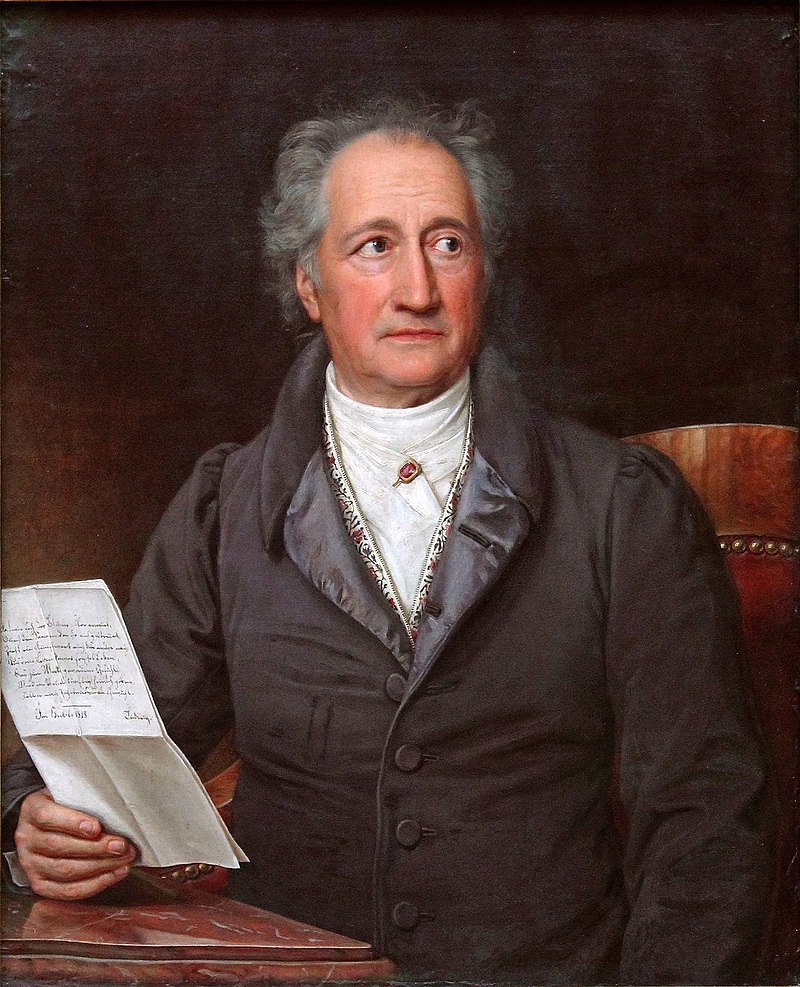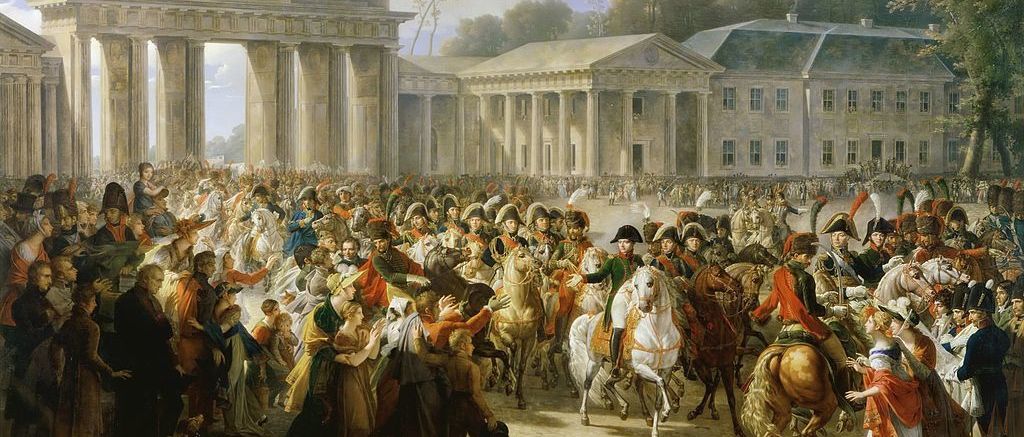Goethe Meets Napoleon
Posted on 26th October 2021
This is the German author, poet and playwright Johann Wolfgang von Goethe’s (1749-1832) own account of his meeting with the French Emperor Napoleon Bonaparte at the Governor’s Palace in Erfurt.
Napoleon had just the previous year during the War of the Fourth Coalition resoundingly defeated the Prussian Army and occupied Berlin. The interview with Goethe had been arranged at Bonaparte’s request:

“The second [of October, 1808]. – Marshal Lannes and minister Maret have spoken about me, I think, favourably. – I have known the former since 1806. – I have been summoned to the Emperor for eleven o'clock in the morning. – A fat chamberlain, Monsieur Pole, tells me to wait. – The crowds disappear. – I am introduced to Savary and Talleyrand. – I am summoned into the emperor's study. – At the same time, Daru has his presence announced. – He is immediately brought in. – This makes me hesitate. – I am summoned a second time. – I enter. – The emperor is seated at a large circular table. He is eating breakfast. On his right, at some distance from the table, is Talleyrand; on his left, Daru, with whom he discusses taxes. – The emperor signals to me to approach. – I remain standing in front of him at a suitable distance. – After looking at me for a moment, he said: “You are a man”. – I bowed my head. – He said to me: “How old are you?” – “Sixty”. – “You are well preserved. You have written some tragedies”. I replied the bare essentials. Daru began to speak. In an attempt to flatter the Germans, to whom he was obliged to do so much harm, he had learned a little about our literature. He was furthermore versed in Latin literature and had even translated Horace. When he spoke of me, his words were more or less those which my Berlin friends would have used. I recognised their way of seeing things and their feelings. – He added that I had translated some French works and, for example, Voltaire's Mahomet. – The emperor said: “That is not a good work”, and then went on in detail about how it was very unfitting for the conqueror of the world to paint such an unfavourable portrait of himself. – He then brought the conversation to Werther, which he must have studied in detail. After several perfectly apposite observations, he mentioned a specific part and said: “Why did you do that? It is not natural. And he spoke at length on this and with great perspicacity.”
I listened, my face calm, and I replied, with a satisfied smile, that I was unaware whether anyone had ever made the same criticism, but that I found it perfectly justified, and that I agreed that you could find fault with this passage's lack of verity. “But”, I added, “a poet can be excused for taking refuge in an artifice which is hard to spot, when he wants to produce specific effects which cannot be created simply and naturally.”
The emperor seemed to agree with me; he returned to drama and made some very sensible remarks, remarks which could only have come from someone who had observed the tragic stage with a great deal of attention – such as a criminal judge might do – someone who felt very deeply how far French theatre had strayed
from the natural and true.
He went on to talk about destiny plays, criticising them. They belonged to the dark ages. “Why these days do they keep giving us destiny?” he said. “There's no destiny, only politics”.
He turned once again to Daru and spoke to him about taxes. I stepped a few paces back and found myself close to the turret where I had, more than thirty years earlier, spent many hours of pleasure and also sadness, and I had the time to note that, to my right, towards the door by which I entered stood Berthier, Savary and another person, Talleyrand had moved away.
Marshal Soult was announced. A tall man with a fine head of hair entered. The emperor questioned him teasingly about some unpleasant events in Poland, and I had the time to look around me in the room and to reflect on the past. The old tapestries were still there. But the old portraits had gone. In that place used to hang portraits of the Duchess Amalia, a hand-painted half mask, and the portraits of all the other governors and members of the household.
The emperor rose, came straight towards me and, and by a sort of manoeuvre, separated me from all the other people in the line in which I found myself. He turned his back to those people and spoke to me lowering his voice. He asked me whether I was married, whether I had children and other personal matters.
He also questioned me on my relations with the house of the princes, on the Duchess Amalia, on the prince and on the princess. I replied in a natural manner. He seemed satisfied and translated for himself these replies into his tongue, but in slightly more forceful terms than I had managed.
I must also remark that, in the whole of our conversation, I had admired the variety of his affirmative replies and gestures, in that he was rarely immobile when he listened. Sometimes he made a meditative gesture with his head and said “Yes” or “That's right”, or something similar; or if he had stated an idea, he most often added; “And what would Monsieur Goethe say to that?”
I took the opportunity to make a sign to the chamberlain to see if I could retire. On his signalling yes, I immediately took my leave.
The fourteenth. I received the Cross of the Légion d'Honneur.”
Tagged as: Fact File
Share this post:





